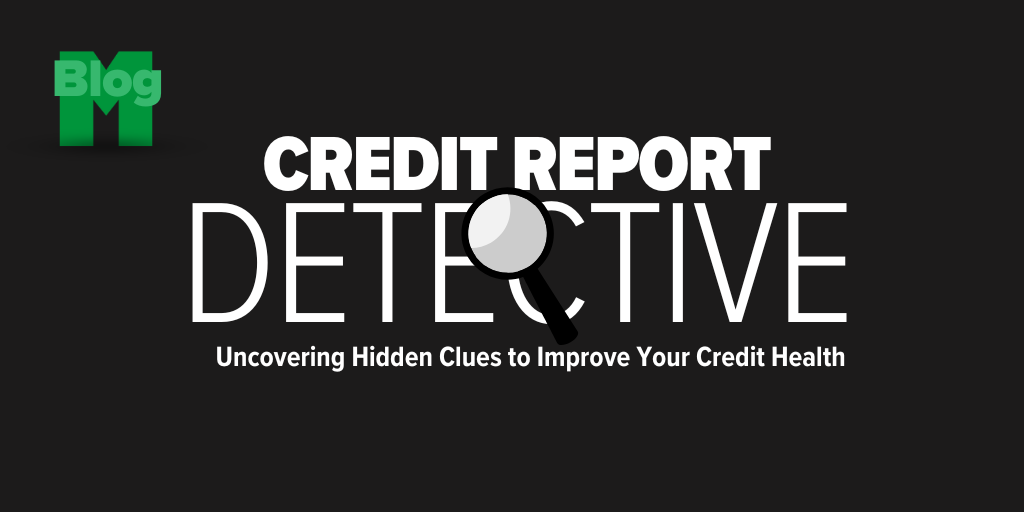
The Credit Report Detective: Uncovering Hidden Clues to Improve Your Credit Health
Your credit health is one of the most important factors in your financial life. One bad tradeline could hurt your ability to get new loans or get the best rates.
Want to know how to improve your credit report like a super sleuth? Here are the hidden clues to improve your credit health.
Payment History is a Major Clue
Your payment history tells the credit bureaus and future lenders the type of borrower you are, good or bad.
Fortunately, ‘late payments,’ are those that are 30 days or more past due. So you have a little leeway should you have a hiccup, but don’t let your payments get more than 30 days late.
If they do, it hurts your credit score tremendously. Your payment history is 35% of your credit score, the largest percentage of any factor.
If you go even later than 30 days, it continues damaging your credit score, and if the debt goes to collections, it’s even worse.
The credit bureaus count your late payments in 30-day increments, so if you fall behind, get caught up as quickly as possible. Moving forward, make all payments on time to make up for the late payment, but know that lenders usually look back at the last 12 months. So you have about a year to make up for even one late payment.
What’s your Credit Age?
Credit age is a commonly misunderstood factor in credit health. You might think, ‘Hey, I opened a credit card a few months ago and have made my payments on time; why is my credit score not increasing?’
Here’s the secret.
Your credit age is a major factor in your credit health. New credit, such as a new credit card, is risky. It lowers your credit age.
The credit bureaus calculate your credit age as an average of all credit lines. So each time you open a new credit line, it lowers the average age.
So, how do you keep your age high?
Don’t apply for new credit, at least within a short time before applying for a major loan, such as a mortgage. Give your credit age as much leeway as possible.
Here’s another way.
Don’t close old accounts. This mostly pertains to credit cards. Let’s say you opened a department store credit card to get the discount, but now don’t use it. Don’t close it! Keep it open, but don’t use it. You can use the older age to your advantage.
Hard Inquiries Hurt Your Credit
It’s normal to want to shop around for the best loans, such as when buying a car or even looking for the best credit card. But here’s the problem: each time you apply, there’s a hard inquiry on your credit report, which hurts your credit health.
This doesn’t mean you can’t apply for multiple loans to get the best deal but do so in a short period. For example, if you’re shopping for an auto loan, get quotes from multiple lenders within a week or two. The credit bureaus will treat it as a single inquiry so you don’t get hit for each one.
Here’s another super sleuth trick.
Don’t apply for new credit within six months to a year of applying for a mortgage.
Why take the chance?
You could hurt your credit score, and it could make a difference in your rate, term, or even the program you qualify for.
Keep all large purchases at bay leading up to a mortgage application. You’ll increase your chances of getting better credit scores and better terms.
Credit Diversity is Key
Detectives look for credit diversity. This means don’t have only one type of credit.
For example, if you only have an auto and personal loan, you prove that you only know how to handle installment loans or loans with fixed payments.
What happens when you finally apply for a credit card? Your credit report won’t show how you handle revolving debt, which could be problematic. What if you get in over your head in debt and cannot afford it?
Have a diverse credit report with revolving and installment debt to beat the detectives. The same is true if you have all revolving debt. You don’t prove that you can handle a fixed payment that installment loans require.
For the best credit diversity, have a credit report with various types of credit throughout the years. Prove you can handle each type of debt responsibly.
Watch your Credit Utilization
Credit utilization is a sneaky one and how credit detectives usually get you. I won’t lie; it’s a tricky one to handle.
Your credit utilization refers to the amount of outstanding debt compared to your credit lines.
Let’s say, for example, you have a credit card with a $1,000 credit limit. You go and spend $1,000, charging it to the credit card. Your credit utilization is 100% and the credit bureaus don’t like that.
At most, you should have 30% of your credit line outstanding. So for the $1,000 credit line, that’s $300. You can spend over that amount, but pay it off as soon as possible to avoid it getting reported to the credit bureaus as a credit utilization rate over 30%.
They also look at your total credit utilization, which means the total out of all your credit cards. So, if you have five credit cards, you can total the limits and the amount outstanding, keeping the percentage at 30% or less.
This is the second largest part of your credit score, so it’s important when playing credit detective and trying to improve your score.
Closing Accounts is Suspicious
You might think you’re doing a good thing by closing old accounts. As we said above, it hurts your credit age and can be disastrous to your credit score.
But it also hurts your credit utilization. Close one credit card and your credit utilization instantly increases because of that total credit utilization we discussed earlier.
Don’t put yourself on the radar, and keep any accounts that you can open. Some lenders close accounts automatically, like a car loan that you paid in full. It won’t remain open, but most revolving debts stay open unless you violate the credit card company’s terms and they close it themselves.
Using The Credit Report Clues to be a Credit Score Superstar
So how do you overcome the credit report detective? Here are the top ways:
- Make your payments on time
Don’t make your payments late, and definitely not 30 days late. Not only does it hurt your credit score, but it costs you more money. Most lenders charge a late fee if you miss a payment, plus you accrue larger amounts of interest.
Create a budget that ensures you can afford your debts and make your payments on time. Set up autopay if you’re worried about missing payments to reduce the risk.
- Keep your debts low
Don’t use your credit cards just because you have them. Keep your debts as low as possible and definitely below the 30% threshold. If you must charge something higher than 30% of your credit line, be sure it’s something you can pay off quickly to avoid damage to your credit score.
- Don’t over-apply for credit
New inquiries may only hit your credit report by a few points, but those points add up quickly! Don’t apply for new credit unless you need it, and avoid doing this before applying for any large loans, like a mortgage.
- Keep old accounts open
Keep as many accounts open as possible to have the oldest credit age. The more history you show, the better it is for your credit score.
- Keep a good credit mix
Show lenders and the credit bureaus that you can handle many types of credit. On-time payments are great, but showing you are well-diversified and can handle your debts is the best way to ensure you get the best credit score.
Final Thoughts
Becoming a credit report detective is the key to being an attractive borrower. If you want the best rates and terms or to be eligible for the best mortgage programs, you must understand how your credit score works.
Check your credit reports often – all consumers get free weekly access! Fix any errors you make; if you ever see fraudulent information, report it immediately!



